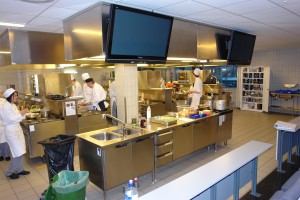Regulation is a big motivator
 I have often written about personal interest as a motivator for training. But a big problem for many is gaining access to learning opportunities. Yes, open education and the proliferation of open elearning mate rails plus social networks offer many opportunities for learning. But, especially in vocational education and training, learners often require access to equipment and facilities, as well as to learning support. Employers are reluctant to spnosor learning and training is usually one of the first casualties of a recession.
I have often written about personal interest as a motivator for training. But a big problem for many is gaining access to learning opportunities. Yes, open education and the proliferation of open elearning mate rails plus social networks offer many opportunities for learning. But, especially in vocational education and training, learners often require access to equipment and facilities, as well as to learning support. Employers are reluctant to spnosor learning and training is usually one of the first casualties of a recession.
Regulation is a possible answer in this respect. It is notable that in Germany where many occupations are regulated, vocat6ional training is both more popular and carries a higher scoail expertise than in the UK, where regulation is limited.
Regulation can be important not only for providing access to training, but in improving health and safety and living conditions for workers.
Over the last three months Pontydysgu has been working in a consortium looking to improve training for ships cooks.
François Eyraud, Director of the International Labour Organisation’s Conditions of Work and Employment Programme, has said: “There is a clear link between good nutrition and high productivity. Decent food at work is not only socially important and economically viable but a profitable business practice too. For employers and workers, proper nutrition at the workplace is a win-win-win proposition.”
However, for the maritime industry the main concerns onboard have often been safety, wages and job security. How seafarers eat while at sea is not given much thought. Too often the meal programme is either an afterthought or not even considered by employers. But access to healthy food on board is essential for “fitness for duty” and is good business leading to gains in productivity and seafarers morale, prevention of accidents and reductions in health-care costs. Adequate nourishment can raise productivity levels by 20% and 1% kilocalorie increase results in 2.27% increase in general labour productivity, according to ILO research.
Present onboard lifestyles are not healthy. The MAT-IQ study showed seafarers have between 70 – 100 % more tobacco abuse than general the population, undertake few physical activities and have a bigger intake of “empty calories” (fat, sugar etc.) than the general population. More than 50% are dissatisfied with food onboard.
Now the Maritime Labour Convention (MLC) is set to change this. The MLC is a global instrument known as the “fourth pillar” of the international regulatory regime for Quality Shipping, complementing the International Maritime Organisation key conventions on safety, education & training, and pollution prevention.
Under the MLC it is becoming mandatory for shipowners to ensure that seafarers are served with food of appropriate quality, nutritional value, quantity and variety such quality food is provided free of charge. Ship’s cooks and catering staff must be competent and must be trained and qualified. Training courses must be approved or recognized by the competent authority, which covers practical cookery, food and personal hygiene, food storage, stock control, environmental protection and catering health and safety.
Furthermore, shipowners must consider the implementation and promotion of health and safety policies and programmes including risk analysis and training to seafarers.
Pontydysgu are particularly interested in how elearning and mobile learning can contribute to training ships cooks. More on this in a future post….
